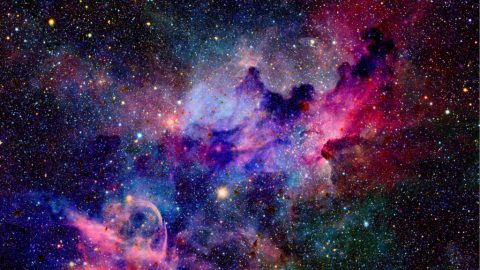A waste of space?

Earlier this year, I took a group of folks from my church to the Museum of Science here in Boston. The goal was to learn about the natural world, have discussions about the relationship between science and Christian faith, and otherwise just have a good time.
After spending the afternoon trying my best to guide us through the dinosaur exhibits (not my field), describe how gravity comes about in general relativity, and talk about how we use different kinds of light to study the cosmos, we took in a planetarium show. The show started on Earth, flew through the solar system, throughout the Milky Way galaxy, and finally out to the depths of intergalactic space. The sheer massiveness of it all still gets me.
Near the end of the presentation, something was said that caught my attention. The presenter noted that the observable universe was filled with hundreds of billions of galaxies containing hundreds of billions of stars. She then said that it was very likely that most (or at least a sizable fraction) of those stars had planets. Some of these planets must have conditions favorable for life. Then, she said, that means that there must be intelligent life everywhere in the universe, because otherwise it would be “a giant waste of space.”
Other than being the cheesiest line from the movie Contact, the sentiment that if intelligent life is not widespread in the universe is a “waste of space” is a common one. But it’s important to recognize that this is a different kind of statement altogether than the question of whether or not extraterrestrial intelligent life exists. That latter question is an empirical one and can be answered by science. We can look for planets around other stars with habitable conditions. Once we find planets, we can attempt to study their atmospheres for the chemical and biological signatures of life. Of course, we can listen for distant signals sent by intelligent beings like they did in Contact (and like they still do with projects like Breakthrough Listen). All of these things are properly within the domain of science, we should do them, and we are (with varying levels of difficulty and success, of course).
Who decides?
But when you start talking about whether or not the presence or absence of such beings determines whether or not the universe is a “waste of space,” you have ventured away from science and off into the world of value judgments, about the way things “ought” to be. Who decides what counts as “wasted space”? We like to think that life should be everywhere, because we are alive, and we happen to like it a lot. But why should the universe “care” about life (and what does that even mean)?
There’s nothing wrong with making value judgments. It’s an essential part of what makes us human. But we need to clearly recognize when this is being done, and not confuse it for a scientific argument. It’s not that one type of inquiry is better or more “true” than the other, it’s just that these are two different things.
Besides all this, the question of “wasted space” is not as straightforward as it is usually presented. Even if every possible habitable planet actually did support intelligent life, you’d still have a lot of inhospitable space, either because it is too hot, too cold, too empty, too dense, bathed in damaging radiation, or doesn’t receive enough of the right kind of energy. This counts for the vast majority of space, which by this measure would still seem “wasted.”
There is a second and even more interesting wrinkle to this argument. The universe began with a Big Bang some 13.8 billion years ago. Given our universe’s laws of physics, it took billions of years for the nuclei of the atoms required for complex chemistry to form in the interiors of stars. While this happened, the universe expanded to enormous size. Since the raw materials for complex life (as we know it) can’t form until the universe is really old, this means the existence of such life, even if it is very rare (or even just on one planet!), will only be found in a large universe such as ours.
Science can’t answer this question
The question of whether or not we are “alone” in the universe will have to be answered by science. But the question of what it means—for whether or not the universe’s space was put to “good use”—can’t be. As a Christian, I approach this question from the perspective that the universe is God’s creation. Psalm 147 says God “determines the number of the stars; he gives to all of them their names.” This tells me that he finds every star, planet, and galaxy interesting whether it has life or not. The universe wasn’t made just for us; it was made by God and primarily for God.
But that doesn’t mean he doesn’t want to share it with us. We’re awed by the sight of a clear night sky, far away from city lights, with its thousands of stars visible, the Milky Way hanging overhead. Every time I show someone Saturn in a telescope with its majestic rings, the reaction is the same: they are stunned by its beauty and can hardly believe it is real. Anyone who has seen a total solar eclipse can testify to the profound experience that it is.
As a scientist, I can testify that there is a version of this same kind of feeling when we are studying the cosmos. When we see images of astronomical objects, we use words like “beautiful,” “lovely,” and “awesome.” Researchers often get attached to particular objects, studying them for an entire career. Just think about it—a galaxy cluster millions of light years across and billions of light years away becoming the focus of a single life’s work. I believe that’s how God shares his vast cosmos with us here on Earth—and with any other intelligent creatures who may happen to be studying it from other worlds.
Regardless of how many eyes are looking up at the skies, I can say with great confidence that there is no “waste of space.”
The post A Waste of Space? appeared first on ORBITER.





